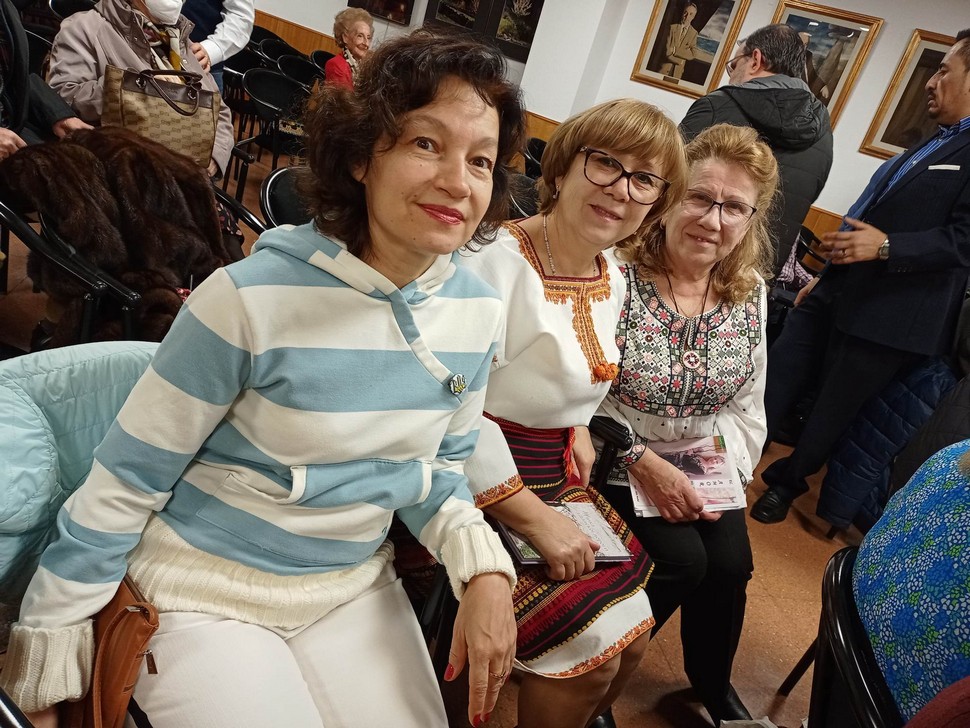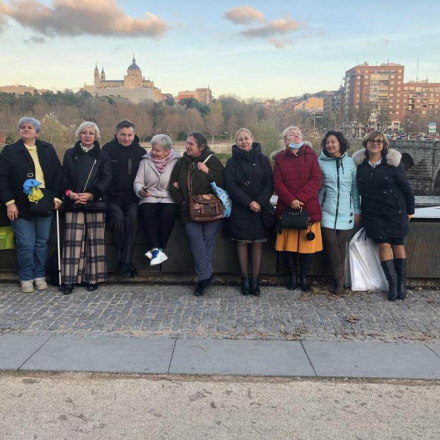“We are alright now, but in our thoughts, we are back home.” Agnia Bohun from Kharkiv speaks about her life under the Spanish sky.

On February 24, 2022, Agnia Bohun woke up at dawn in her Kharkiv home to explosions. The air was roaring and houses were collapsing. Not far away, high-rise buildings were turning into charred skeletons. “We packed emergency suitcases and hid with our child in the corridor under the wail of sirens,” Agnia said. “When the enemies blew up the monumental building of the Kharkiv administration, a symbol of power and stability, I realized that things were too bad and decided to leave the city."
Leaving was not easy. Public transport and taxis stopped operating. Volunteers took Agnia and her daughter out of Kharkiv on an old mini-bus with several others. Later, Agnia discovered that one of these volunteers, Anton, had been killed in the summer by enemy shelling. "My daughter and I were going with no destination, away from the explosions," Agnia says. “My elderly parents refused to leave their home. They are still in danger, which makes me very sad.”
In March, Agnia and her family learned about a charitable organization that hosts refugees in Western Ukraine. After four days of travel and taking four trains, they reached the Caritas-Spes center in a picturesque corner of the Carpathians. Agnia remembers immediately feeling the compassion and care from staff and volunteers upon entering the center. Employees welcomed them and provided the necessary assistance of shelter, food, and clothes.
"Gradually, we recovered after the shock, stopped being afraid of every door slamming or plane flying over," Agnia said. “The new refugees kept coming and going with children, the elderly, and pets. There was a place for everyone and a kind word, for which I’m grateful to the center’s administration, its employees Kamila, Solomiya, and many others."
Step by step, they learned how to live under unusual conditions, to set new goals and be helpful. Psychologists helped them with their mental health, trainers taught them how to strengthen the body, and priests opened the way to faith. Agnia began to record the stories of women who, together with their children, left their native places and wrote essays about their experiences.
As the war continued, more displaced people arrived with heart-wrenching stories. Agnia and her daughter had already recovered from the shock. But it was too early and dangerous to return to the native city near the border. Fierce battles were continuing near their home so they accepted an offer to go to Spain. They believed they would wait a month or two, and the carnage would end.
“We were staying both in a refugee center and with Spanish families,” Agnia said. “We gradually learned a new language and society. We stayed for five months in the refugee center, and we enjoyed kindness and care every day.”
Agnia and her daughter stayed with two Spanish families for another six months. These families welcomed them into their homes free of charge because they really wanted to help Ukrainian women whose peaceful lives were destroyed by the war. They helped them adapt and learn new traditions.
"We were detached from our family, our roots,” Agnia said. “But thanks to these people, we did not feel bitter loneliness in a foreign land. There were new friends nearby. They introduced us to the wealth of centuries-old Spanish culture: palaces, museums, and parks. Thanks to them, we learned how Easter and Christmas are celebrated here and how the Holy Week processions and the Three Wise Men's cavalcades are organized.”
While in Spain, Agnia met Oleksandr and Tatiana, scientists from Kharkiv. When the war started, they had been working in Madrid, contracted by the Spanish government. These Kharkiv residents had never met in their hometown, but they became good friends in Spain. Their apartment turned into a meeting point for Ukrainians.
“It's great when there are people you can turn to with any question,” Agnia said.
They also got acquainted with the creative association "Nashe Slovo" and its head Halyna. Agnia was invited to their creative meetings of this community and was invited to read one of her essays.
“I was very nervous reading my piece in Spanish for the first time in front of such a knowledgeable audience,” Agnia said. “Hearing the applause and positive feedback from the Spanish writers was a real reward. It is a great joy to meet like-minded people who are concerned not only with everyday life but also have spiritual interests."
Agnia continues to draw and write fiction and is also studying marketing at a Ukrainian online company. Her short story was translated into Spanish and her articles on Ukraine were also translated. Her daughter is studying at school and is at the top of her class in mathematics and computer technology. Her English and Spanish are also at a high level.
I'm happy she found good friends here and doesn't feel isolated, so everything is fine with us now,” Agnia said. “"It was a difficult year, a time of pain and losses, separation and difficult decisions…mentally, we are still at home. Terrible news about Russia's daily crimes against Ukraine comes from there. We have no choice. We have to persevere."









